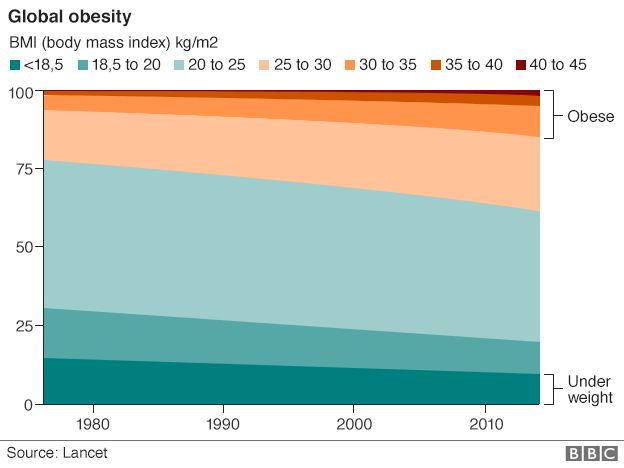Courting That Obesity Epidemic
"They [world governments] should be as nervous as a cat on a hot tin roof about the tsunami of diabetes that's coming their way. The cost of this rise in the prevalence of obesity is going to be staggering."
Bill Dietz, George Washington University
"It has been very easy, as countries get out of poverty, to eat a lot, and to eat a lot of unhealthy calories."
"[The price of fresh fruits, vegetables and whole grains are often] noticeably more than highly processed carbohydrates."
"The issue really comes down to people either not having enough to eat [in emerging economies] or not having enough healthy food to eat. It becomes a manifestation of the same problem."
Majid Ezzati, chair, global environmental health, Imperial College, London
 Getty Images
Getty ImagesThe simple truth is that whole foods are not at all that expensive in many countries, but they do require basic cooking techniques that all too many people have no wish to bother with. Preferring to sacrifice nutrition for fat/salt/sugar-laden food that appeals to their primary taste senses and requiring little or no preparation, coming ready-to-eat, their convenience of acquisition and ingestion another selling point besides the fact that 'everybody does it'.
Scientists are pointing to the year 2025, predicting that when it rolls around, based on current trends in food consumption and over-eating of energy-dense, nutrition-poor foods roughly one-fifth of the world's adults will be classified as obese. At the present time the world can boast a 640-million-strong component of obese adults, over six times the total that existed of 105-million, in 1975.The exponential, worrying growth of obesity in the general population does not bode well for the future.
It has been pointed out time and again that excess weight raises risks of diabetes onset, heart disease, and other chronic health conditions that impair the quality of life and longevity itself, aside from being costly to society in workplace absences due to health problems, and in treatment costs. According to an analysis published in The Lancet, the likelihood of meeting the goal set by the World Health Organization to stem the obesity tide in the next decade is "virtually zero".
The study, produced by lead author Majid Ezzati, notes that the new reality will challenge governments with a massive increase in serious health problems suffered by the growing number of obese in all populations of the world. Skyrocketing health care costs and allied costs of pharmaceuticals used in medical treatment of illness and disease will consume an ever greater proportion of government revenues.
- China has the largest number of obese people in the world with 43.2 million men and 46.4 million women
- The US has 41.7 million obese men and 46.1 million obese women
- In comparison, in the UK the study found 6.8 million obese men in 2014, and 7.7 million obese women
Conversely, low body weight remains a health risk in parts of Africa and South Asia, where people don't get enough to eat, to be sure. But heavy body weight has become a much more common hazard world-wide. Women who qualify as obese now outnumber those women who are underweight and have done so for over a decade. A larger problem was underweight men, when that too turned around five years ago.
If an adult BMI is below 18.5, or someone five-foot-nine weighs less than 125 pounds they are placed in the underweight category. Back in 1975, more than twice as many people were underweight than those who were classed as obese.

Labels: Bioscience, Crisis Management, Health, Human Nature

0 Comments:
Post a Comment
<< Home